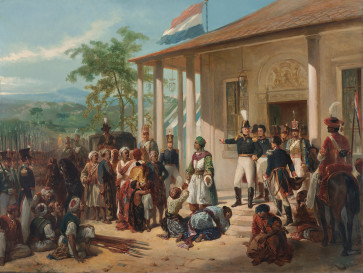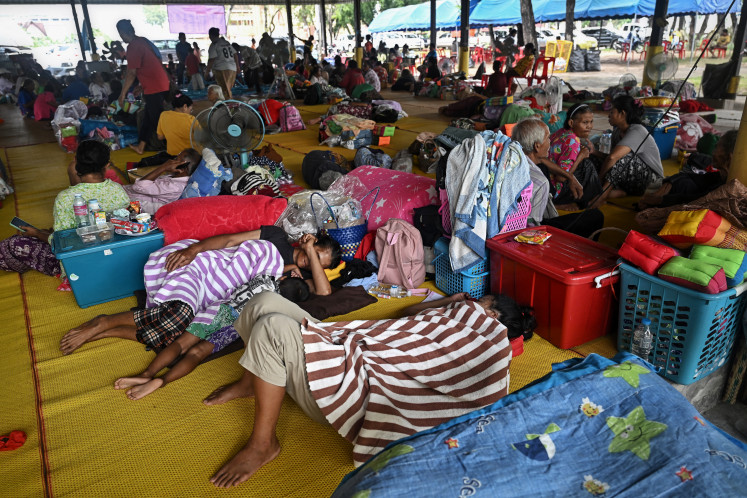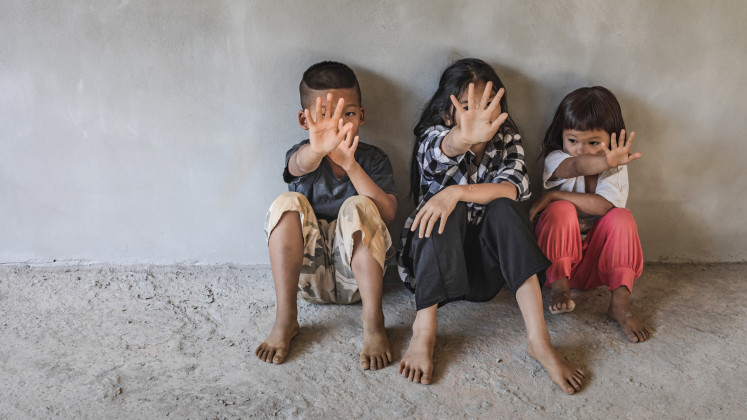Popular Reads
Top Results
Can't find what you're looking for?
View all search resultsPopular Reads
Top Results
Can't find what you're looking for?
View all search resultsProject for Better change
Human trafficking is a serious issue in developing countries, but many people are not aware of the problem until it is too late
Change text size
Gift Premium Articles
to Anyone
H
uman trafficking is a serious issue in developing countries, but many people are not aware of the problem until it is too late.
Hoping to cut down on illegal human trafficking in the country, Erik Ramadhanil started a social project called “Preventing the Human Trafficking of Students”.
Erik Ramadhanil poses at the International Youth Forum Seliger 2011 in Russia. Courtesy of Erik Ramadhanil
The 22-year-old and recent graduate from the University of Indonesia said he was not aware about the danger or the consequences of illegal human trafficking until he started an internship at the International Organization for Migration (IOM) in Indonesia.
During the internship at the organization’s counter-trafficking unit, he learned about the problem and helped trafficking victims get to rehabilitation centers.
His first-hand experience inspired him to start the project.
“The experience touched my heart and soul. I was sad to find out that most of the victims were children and women,” said Erik, who was also an Indonesian delegate to the International Youth Forum Seliger 2011 in Russia.
The project was selected as one of the three best projects at the forum. It was picked from among hundreds of initiatives from around the world put forward by some 3,000 delegates to the forum.
Erik said he spent months preparing and launching the project with the support of 11 friends after he had gained enough knowledge and information about illegal human trafficking.
Human trafficking, a crime against humanity, involves an act of recruiting, transporting, transferring, harboring or receiving a person through a use of force, coercion or other means, for the purpose of exploiting them. Every year, thousands of men, women and children fall into the hands of traffickers, in their own countries and abroad. Every country in the world is affected by trafficking, whether as a country of origin, transit or destination for victims.
The project’s theme — which deals with a social problem faced by most countries in Asia — was selected
by the forum as a global project after a competitive presentation and group debate.
“I presented the real and horrible cases of illegal human trafficking to the forum’s participants,” Erik said. “I am so happy to win this recognition. It is not only my own achievement but also the whole nation’s.”
With the project funded by the International Youth Forum Seliger 2011, Erik and his colleagues started running the project, both in Indonesia and other countries affected by human trafficking.
Erik said that his target group would be junior high school students because they were easily influenced by media and social networking sites, which encourage more and more students to find jobs in other countries.
“Our group plans to hold group discussions with government and education officials to get their advice and suggest that they put human trafficking cases in school curriculum,” Erik said.
Project members would also go to high schools in rural areas where people do not have enough information on human trafficking and thus become easy targets due to their economic hardships.
“With information, people will be able to save themselves and make good decisions,” he said.
“We do not help the trafficked victims, but we help prevent people from being trafficked. That’s our project’s mission.”
Erik said that according to Michael Marmanof, head of the Seliger Forum 2011 committee, his project was chosen because it helps deal with problems that not only happen in Indonesia but also in other countries.
After being recognized for his global project, Erik and his team members start shaping the project, conducting surveys and research about human trafficking in high-risk areas and high schools.
They conducted surveys in Bandung, Sukabumi, Subang and Indramayu in West Java as well as in Pontianak, Sambas and Singkawang in West Kalimantan involving large groups of students.
“We not only conduct surveys but also do focus group discussions to allow the students to share their ideas and experiences,” Erik says.
The project members also involved community members and others, such as the police, local officials, manpower agencies, teachers and NGOs, in their research.
Erik said that his main challenge was in learning people’s different cultures to get his message across.
Andro, a 13-year-old student from SMP 143 junior high school in Cilincing, North Jakarta, participated in the project and said he had learned many things about the issue. “The lecture provided me with the knowledge and dangers of illegal human trafficking.” the student said.
The project members also plan to make leaflets, comics, magazines and brochures as well as placing ads on TV and radio to reach more people.
“But we need backup from the government, NGOs, media and the police to achieve the project’s goal,” Erik said.
The writer is an intern at The Jakarta Post.










